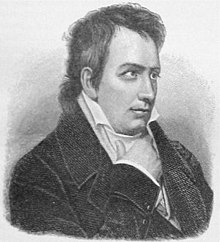The scholar
The scholar is a novella by Ludwig Tieck that appeared in Leipzig in 1827.
A wealthy, urbane high school professor who lives only for his science will still find the right woman.
content
The councilor lives with his wife and three marriageable daughters Antoinette, Jenny and Helena in the “lower room” of his “quiet house”. The professor, who loves peace and quiet, “director of the Gymnasium” has rented the upper floors. The professor, who knows Latin, has just left. So Helena, the council's youngest daughter, dares to go up. Admitted by the friendly housekeeper - the "elderly" Gertrud - Helena can marvel at the professor's library "in the large hall and three adjoining rooms". This collection is filled with the "pagan classics" and also with scientific works from the pen of the professor. In contrast to her lusty, flighty sisters, the quiet, modest, hardworking Helena loves seclusion; enjoys “good books”. As a “souvenir”, Lenchen, as Helena is still called, steals a loose octave leaf and “sticks it in her bosom”.
The professor returns with his childhood friend and confidante, the doctor. The old servant Werner receives them both. Of course, the professor soon asked Gertrud about the missing octave sheet with the “ Emendation of a passage from the Quintilian ”. Lenchen does not reveal the housekeeper. The professor actually has other worries. He has to remove the young teacher Adrian from the teaching staff of the high school due to incompetence. But the professor generously enables the young airman to qualify as a teaching profession for three years. The professor has money, but he cares little about it. Rather, he needs his rest. The scientific studies require time and more time. The scholar's hypochondria worsens. As a doctor, the doctor, his friend, knows a remedy: the professor should finally get married. An inheritance for the money, the knowledge and the books is needed. To the doctor's surprise, the professor accepts the proposal - on one condition: the doctor must choose the right woman and initiate the desired marriage. Said and done. The doctor selects Antoinette and prepares the engagement date.
Helena is deeply offended when she hears the news and realizes that she basically loves the professor. But the "good, graceful" girl complies. It wants to “stand by” the future couple, wants to help. Werner and Gertrud are horrified. Suddenly her little world is out of joint. In a short-circuit reaction, they ask their employer, the professor, for permission to marry. In their old days, the couple wants to bring at least a screamer into the world. The professor allows the marriage and buys precious jewelry for his future bride Antoinette. The doctor provides the professor with details for the upcoming engagement. In the council's household, the three daughters take turns doing the kitchen work. On the engagement day, it will be Antoinette's turn to do the kitchen duty. According to the well-informed friend's calculation, the professor could most likely find his future wife alone in the kitchen.
On the day in question, the scholar went down the stairs anxiously. “The strange man” has lived in the rented house for over 15 years and, despite all his studies, has not even met the council's family. So he anxiously enters the kitchen, puts the engagement ring on the finger of the perplexed Helena - who is once again standing in for her sister Antoinette at the stove - and, suddenly brave, presses the engagement kiss on the tender mouth of the young girl. The parents, especially the mother, insist on the immediate correction of the "false" engagement. But the professor cannot be changed: God arranged it that way. And Lenchen is the right woman for him. As “compensation for pain and suffering”, he gives Antoinette the very valuable jewelry. The refined recipient is delighted that the “dreadful fool” is marrying the sister - Lenchen, this stupid little one.
Three years after the events outlined above, Werner and Gertrud still have no shouters, but the professor and Lenchen are celebrating the baptism of their first child, a boy. The professor and Lenchen weren't lazy either. The scholar has trained his docile wife to such an extent that, in addition to breastfeeding the child, she can do “corrections” to his “latest Latin work”. Adrian also took his learning assignment seriously. The professor withdraws from grammar school to his private library and leaves the now finally ambitious Adrian to train the school youth in the Latin language. Antoinette, also sensible, becomes Adrian's wife.
reception
- Categorization: From 1819 to 1842 the Berliner Tieck lived in Dresden. In his chapter "Dresdner Novellistik" Gebhardt classifies the work under "Bürgerovellen".
- Minor calls the novella "a most graceful and charming portrayal of professorialism".
- Fairytale: Although Gebhardt exclaims “A brilliant achievement!” And means the accurate character drawing in a confined space, but at the same time he puts his finger on an exposed wound: The novella is actually a Cinderella story.
literature
source
- Gotthold Ludwig Klee (ed.): Tiecks works. Third volume. The scholar. P. 1–44 in Meyer's classic editions. Bibliographical Institute Leipzig and Vienna 1892.
First edition
- Ludwig Tieck: The scholar. Novella in: Orphea. Paperback for 1828. With engraved title and frontispiece. Fleischer, Leipzig 1827.
expenditure
- The text from the "Schriften" from 1852 (Karl Eichwalder, Fürth): The learned
- PDF: Ludwig Tieck's writings, vol. 22, Georg Reimer Berlin 1853, (novellas vol. 6) (PDF; 14.5 MB)
- The text anno 1892 (Klee) (Karl Eichwalder, Fürth): The learned
- Ludwig Tieck: The scholar. With eight original lithographs by Heinrich Hussmann . Singer, Leipzig 1926.
Secondary literature
- Roger Paulin: Ludwig Tieck. Metzlersche Verlagsbuchhandlung, Stuttgart 1987, ISBN 3-476-10185-1 . (Series Metzler Collection; M 185).
- Armin Gebhardt: Ludwig Tieck. Life and complete works of the "King of Romanticism". Tectum, Marburg 1997, ISBN 3-8288-9001-6 , pp. 252-254.
